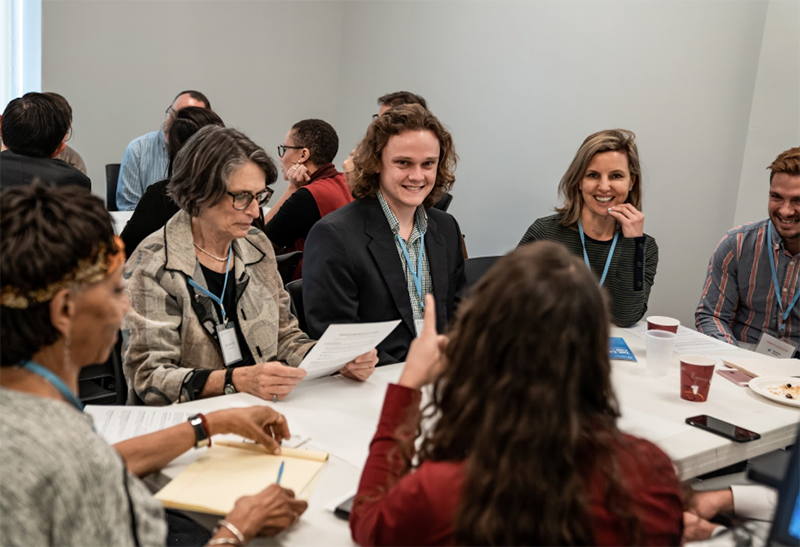
Building technical solutions to empower local governments to better engage with and understand the needs of their residents, I know how difficult it is to equitably collect feedback that leads to actionable insights. Feedback collection and analysis is the heart of our work at Acta Solutions. We work with local government agencies to create more equitable engagement practices that allow them to better answer the questions they want to know about their community. We also sell feedback analysis software that draws out the common trends and insights from large amounts of unstructured data in the form of open ended survey responses, and focus group transcripts.
Needless to say, we care a lot about feedback, and the power it holds to make governments more transparent and equitable.
This October, I had the opportunity to attend the Feedback+New York summit along with one of my co-founders at Acta Solutions, Tai Huynh. We were blown away by how much excitement and passion for feedback there was in the room during every session throughout the day. I could go on for days about all of the insights I had throughout the summit, but a couple stood out as particularly relevant to my work with Acta Solutions. I was able to attend a series of lightning talks that included presentations from Luke Church of Africa’s Voices and Samhir Vasdev of IREX. Luke presented on his work with Africa’s Voices and emphasized that listening to feedback is often framed as a technological problem, when in reality, it often is more of a question of those in power making the effort to listen.
Even with the most technologically advanced feedback mechanisms, no change can occur based on that feedback until those in power make the effort to listen, and are held accountable to the needs of the communities they serve.
Samhir talked in detail about IREX’s work on a project in Tanzania, where they made efforts to share back feedback collected to the communities they served, and how this greatly increased the willingness of community members to participate in further public engagement efforts. Both Samhir and Luke’s work are highly relevant to what we do at Acta Solutions. From Luke’s work with Africa’s Voices, we can see that fully automating the process of feedback collection and analysis is not the end-all-be-all solution to the challenges of public engagement. Technology can aid in that effort, but those in power must still be willing to listen to the needs of their communities, and must be held accountable to those needs. The key here is that technology can and will be a part of the solution, but technology itself can’t be the solution. From Samhir and IRX’s work in Tanzania, we can see the power of sharing back the insights from feedback to the community that the feedback was collected from. Too often, feedback can feel like it is going into a black hole for those providing the feedback — Samhir’s work shows a way to change that perception. So often in working with local governments, when we present a piece of technology that can automate most of the process of analyzing feedback, we hear how the insights generated by an objective technical system are much more likely to be trusted by residents and elected officials than analyses performed manually by in-house staff. This is good, and this is what we hope to do with the technology that we develop. But, as I take what I’ve learned from hearing Luke’s perspective on feedback collection back to my work at Acta Solutions, I will be thinking about how we can better communicate that the solution we sell should be used to augment the insights drawn from a public engagement effort and not be a complete replacement for human to human communication. I’ll also be thinking about ways that we can improve our solution to better allow local governments to sift through data in addition to providing insights that we currently provide in a largely automated fashion. Lastly, as we continue to work with our local government clients, I will take the lessons from Samhir’s work and envelop data sharing practices into the way that we help local governments shape their public engagement efforts.
There is a fine line to be walked in feedback collection between just enough automation and too much automation. Technology has made it easier than ever for organizations to reach out to the communities they serve. However, it has not necessarily improved the quality of the interactions between organizations and their communities.
The insights I’ve gained from Feedback Labs will help myself and my team better walk the line between automation that helps local governments understand the needs of their communities, and avoid the kind of automation that takes the human aspect out of feedback.

Andrew is the current CTO of Acta Solutions, where he works alongside local governments in the U.S. to develop technologies that help local governments make sense of public input. His interests lie in using technology to make government more accessible, transparent, and representative. He is also a current senior at UNC-Chapel Hill studying computer science and in his spare time Andrew enjoys the outdoors and spending time with friends and family.






